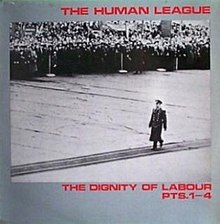
Vostok 1 was the first spaceflight of the Vostok programme and the first human orbital spaceflight in history. The Vostok 3KA space capsule was launched from Baikonur Cosmodrome on 12 April 1961, with Soviet cosmonaut Yuri Gagarin aboard, making him the first human to reach orbital velocity around the Earth and to complete a full orbit around the Earth.
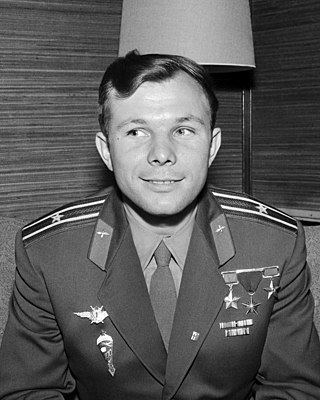
Yuri Alekseyevich Gagarin was a Soviet pilot and cosmonaut who, aboard the first successful crewed spaceflight, became the first human to journey into outer space. Travelling on Vostok 1, Gagarin completed one orbit of Earth on 12 April 1961, with his flight taking 108 minutes. By achieving this major milestone for the Soviet Union amidst the Space Race, he became an international celebrity and was awarded many medals and titles, including the nation's highest distinction: Hero of the Soviet Union.

The Human League is an English synth-pop band formed in Sheffield in 1977. Initially an experimental electronic outfit, the group signed to Virgin Records in 1979 and later attained widespread commercial success with their third album Dare in 1981 after restructuring their lineup. The album contained four hit singles, including the UK/US number one hit "Don't You Want Me". The band received the Brit Award for Best British Breakthrough Act in 1982. Further hits followed throughout the 1980s and into the 1990s, including "Mirror Man", "(Keep Feeling) Fascination", "The Lebanon", "Human" and "Tell Me When".

Gherman Stepanovich Titov was a Soviet cosmonaut who, on 6 August 1961, became the second human to orbit the Earth, aboard Vostok 2, preceded by Yuri Gagarin on Vostok 1. He was the fourth person in space, counting suborbital voyages of US astronauts Alan Shepard and Gus Grissom. A month short of 26 years old at launch, he is the youngest Astronaut and was the youngest person to fly in space until 2021 when Oliver Daemen flew on Blue Origin NS-16 at the age of 18. Since Daemen flew a suborbital mission, Titov remains the youngest man to fly in Earth orbit.

Andriyan Grigoryevich Nikolayev was a Soviet cosmonaut. In 1962, aboard Vostok 3, he became the third Soviet cosmonaut to fly into space. Nikolayev was an ethnic Chuvash and because of it considered the first Turkic cosmonaut.

Vostok was a class of single-pilot crewed spacecraft built by the Soviet Union. The first human spaceflight was accomplished with Vostok 1 on April 12, 1961, by Soviet cosmonaut Yuri Gagarin.

The Vostok programme was a Soviet human spaceflight project to put the first Soviet citizens into low Earth orbit and return them safely. Competing with the United States Project Mercury, it succeeded in placing the first human into space, Yuri Gagarin, in a single orbit in Vostok 1 on April 12, 1961. The Vostok capsule was developed from the Zenit spy satellite project, and its launch vehicle was adapted from the existing R-7 Semyorka intercontinental ballistic missile (ICBM) design. The name "Vostok" was treated as classified information until Gagarin's flight was first publicly disclosed to the world press.

Vladimir Sergeyevich Ilyushin was a Russian military officer and a test pilot in the former Soviet space program. Ilyushin was son of Sergey Ilyushin whose career spent mostly as a test pilot for the Sukhoi OKB. After retiring from the space program, Ilyushin became a sport administrator and was inducted into the World Rugby Hall of Fame in 2013.

Korabl-Sputnik 5 or Vostok-3KA No.2, also known as Sputnik 10 in the West, was a Soviet spacecraft which was launched in 1961, as part of the Vostok programme. It was the last test flight of the Vostok spacecraft design prior the first crewed flight, Vostok 1. It carried the mannequin Ivan Ivanovich, a dog named Zvezdochka, television cameras and scientific apparatus.

The flexi disc is a phonograph record made of a thin, flexible vinyl sheet with a molded-in spiral stylus groove, and is designed to be playable on a normal phonograph turntable.

Cosmonautics Day is an anniversary celebrated in Russia and some other post-Soviet states on 12 April. In 2011, at the 65th session of the United Nations General Assembly, 12 April was declared as the International Day of Human Space Flight in dedication of the first crewed space flight made on 12 April 1961 by the 27-year-old Soviet Russian cosmonaut Yuri Gagarin. Gagarin orbited the Earth for 1 hour and 48 minutes aboard the Vostok 1 spacecraft.
The Lost Cosmonauts or Phantom Cosmonauts are subjects of a conspiracy theory, which alleges that Soviet and Russian space authorities have concealed the deaths of some cosmonauts in outer space. Proponents of the Lost Cosmonauts theory argue that the Soviet Union attempted to launch human spaceflights before Yuri Gagarin's first spaceflight, and that cosmonauts onboard died in those attempts. Soviet military pilot Vladimir Ilyushin was alleged to have landed off course and been held by the Chinese government. The Government of the Soviet Union supposedly suppressed this information, to prevent bad publicity during the height of the Cold War.
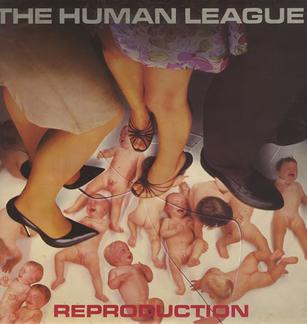
Reproduction is the debut studio album released by British synth-pop group The Human League. The album was released in 1979 through Virgin Records.

The Golden Hour of the Future is a compilation album of recordings made by the electronic band the Future and early recordings by the original line-up of the Human League.

"Empire State Human" is a song by the British synth-pop group The Human League. The song was written by Philip Oakey, Martyn Ware and Ian Craig Marsh. It was co-produced by The Human League and Colin Thurston, and recorded at Monumental Studios in Sheffield.

Cut-throat Records is a record label created and run by Canadian musician Nash the Slash. It has been active from 1978 to the present. Cut-throat is also the name of Nash's recording studio, originally located above the Roxy Theatre on Danforth Avenue in Toronto.
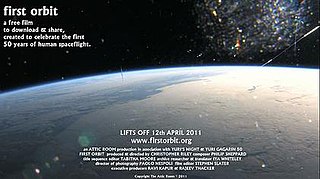
First Orbit is a 2011 feature-length, experimental documentary film about Vostok 1, the first human space flight around the Earth. By matching the orbit of the International Space Station to that of Vostok 1 as closely as possible, in terms of ground track and time of day, documentary filmmaker Christopher Riley and European Space Agency astronaut Paolo Nespoli were able to film the view that Yuri Gagarin saw on his pioneering 1961 orbital space flight. This new footage was cut together with the original Vostok 1 mission audio recordings sourced from the Russian State Archive of Scientific and Technical Documentation. The film features the music of composer Philip Sheppard.

Gagarin: First in Space a.k.a.. First man In Space is a 2013 Russian docudrama biopic about the first man in space, Yuri Gagarin, and the 1961 mission of Vostok 1. It was released by Central Partnership theatrically in Russia on June 6, 2013, and in the United Kingdom on DVD on June 23, 2014 by Entertainment One. The film's running time of 108 minutes approximates the time it took Gagarin to go around the Earth before returning. It stars Yaroslav Zhalnin as Soviet fighter pilot and cosmonaut Yuri Gagarin. The film received mixed reviews, with some critics praising the film's acting, direction and storytelling with others touching on the film's "cheap-looking" visual effects. The film received criticism for its state funding and ignoring the aftermath of the flight.
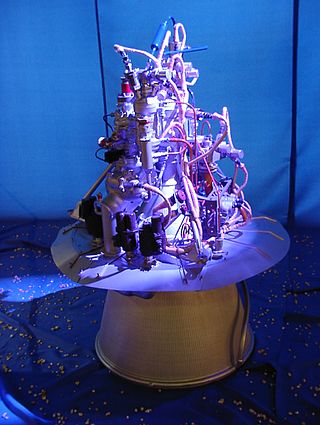
The RD-0109 is a rocket engine burning liquid oxygen and kerosene in a gas generator combustion cycle. It has single nozzle and is an evolution of the RD-0105. It was the engine used on the Vostok Block-E that launched Yuri Gagarin to orbit.
Yuri Gagarin is a rock band from Gothenburg, Sweden. Formed in 2012, the band consists of lead guitarist Christian "Crille" Lindberg, rhythm guitarist Jon Eriksson, bass guitarist Leif Göransson, synthesizer player Robin Klockerman, and drummer Stefan "Steffo" Johansson.
